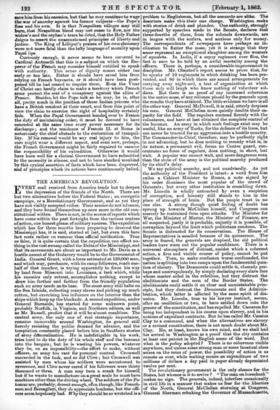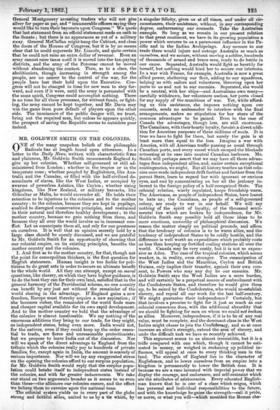THE AMERICAN REVOLUTION.
"E VERY mail received from America tends but to deepen the depression of the friends of the North. There are but two alternatives before the Federal States ; an energetic campaign, or a Revolutionary Government, and as yet they have not visibly accepted either. Their armies do not advance, and they have bound themselves up once more in the old constitutional withes. There is not, in the scores of reports which have come within the past fortnight from the various centres of action, one honest gleam of military success. The expedition which has for three months been preparing to descend the Mississippi has, it is said, started at last, but even this bare fact rests rather on rumour than official notification. True or false, it is quite certain that the expedition can effect nothing in the vast swamp called the Delta of the Mississippi, and that its movements are about as important to Mr. Davis as a hostile ascent of the Godavery would be to the Government of India. General Grant, with a force estimated at 120,000 men, and which may, perchance, with its camp followers, reach onehalf of that number, is trying apparently to force his way by land from Missouri into Louisiana, a task which, while his enemies only retreat, accomplishes nothing, except to draw him farther and farther from the friendly population such an army needs as its base. The coast army still halts on the Sea Iolanda, collecting many slaves and picking up much cotton, but exercising less influence on the interior than the ships which keep up the blockade. A second expedition, under General Burnside, has started for some unknown point, probably Norfolk, in Virginia, and Northern editors, as well as Mr. Russell, prediot that it will be almost resultless. The central army, the only one of real strategic importance, remains immovable around Washington, its general still fiercely resisting the public demand for advance, and the temptation constantly placed before him in Southern stories of army dolmomlization. He is indefatigable in his work, tries hard to do the duty of his whole staff and the bureaux into the bargain ; but he is wasting his powers, whatever they be, on an impossibility—the effort to make, without officers, an army too vast for personal control. Cromwell succeeded in the task, and so did Clive ; but Cromwell was assisted by men whom his soldiers were accustomed to reverence, and Clive never cared if his followers were thirty thousand or three. A man may turn a crank for himself, but if he wants to manufacture on a great scale he must have machines other than the driving wheel. The soldiers of the Potomac are, probably, decent enough, den though, like Frenchmen and Bersaglieri, they do appreciate bonbons, but the officers seem hopelessly bad. Why they should be so wretched is a problem to Englishmen, but all the accounts are alike. The deserters make this their one charge. Washington reeks with stories of drink and plunder. One authority, strongly supported by speeches made in the Senate, declares that three-fourths of them, from the colonels downwards, are in league with the sutlers, and anxious only for money. The correspondents of newspapers have perhaps an inclination to flatter the mass, yet it is strange that they never represent an exceptional slaughter among the wearers of epaulets. In India, if a sepoy regiment ever flies, the fact is sure to be told by an awful mortality among the officers. There is, perhaps, a considerable improvement in discipline. Mr. Olmsted's report seems to prove that, for he speaks of 10 regiments in which drinking has been pre vented, and 80 in which there are sound arrangements for carrying away night-soil, a test of organization at which those only will laugh who know nothing of volunteer soldiers. But there is no proof of any increased coherence in the entire mass, of any reliance placed by the generals upon the results they have attained. The little evidence we have is all the other way. General McDowell, it is said, utterly despises his men. General McClellan more quietly doubts their capacity for the field. The regulars contend fiercely with the volunteers, and have at last obtained the complete control of the bureaux. An army in which such feelings exist may be useful, like an army of Turks, for the defence of its lines, but can never be trusted for an aggression into a hostile country. The Commander-in-Chief, therefore, may be perfectly right in not advancing, but he does nothing to remedy what is, in its nature, a permanent evil, forms no Centre guard, concentrates no force of regulars, does nothing, in short, but wait. A popular war cannot wait, and more dangerous even than the state of the army is the political anarchy produced by its chief's delay. We say political anarchy, and not unadvisedly. As yet the authority of the President is intact: a word from. him exiles a Cabinet Minister to Russia, a note signed by his order dismisses the most popular of the crowd of Generals ; but every other institution is crumbling down. Mr. Lincoln is wholly untouched by even a suspicion of corruption, and honesty still stands to him in the place of strength of brain. But the people trust in no one else. A strong though quiet feeling of doubt has sprung up towards McClellan himself, and Congress can scarcely be restrained from open attacks. The Minister for War, the Minister of Marine, the Minister of Finance, are all suspected, justly it is probable, unjustly it is possible, of corruption beyond the limit which politicians condone. The Senate is distrusted for its conservatism. The House of Representatives is assailed because of its quiescence. The army is feared, the generals are despised, the old political leaders have worn out the popular confidence. There is a universal atmosphere of distrust, amidst which a coherent action, a firm and visible course of policy, cannot be put together. Then, to make confusion worse confounded, the nation is splitting into two camps upon the fundamental question of slavery. The Democrats could settle it, clumsily perhaps and unscrupulously, by simply declaring every slave free whose master aided in the rebellion, but they distrust the abolitionists and the men of the Border States. The abolitionists could settle it on clear and unmistakable principle, but they distrust the Democrats and the Administration, which latter is affected by the same spirit of disunion. Mr. Lincoln, true to his lawyer instinct, seems, after an oscillation or two, to have settled down into the groove of the constitution, and has expelled Mr. Cameron for being too independent in his course upon slavery, and in his notions of expedient contracts. But he has called Mr. Cassius Clay to a command, and when the alternatives are slavery or a revised constitution, there is not much doubt about Mr. Clay. He, at least, knows his own mind, and we shall hail his arrival in Washington as a proof that the city contains at least one patriot in the English sense of the word. But what is the policy adopted ? There is no coherence visible anywhere, and unless some strong man or some fanatical class seizes on the reins of power, the possibility of action is as remote as ever, while waiting means an expenditure of two millions of dollars a day paid in paper already depreciated twelve per cent. The revolutionary government is the only chance for the States, but whence is it to arrive ? "The man on horseback" makes no sign. The generals, indeed, interfere occasionally in civil life in a manner that makes us fear for the liberties of the North, General McClellan storming at Congress, General Sherman rebuking the Governor of Massachusetts, General Montgomery arresting traders who will not give silver for paper at par, and "innumerable officers saying they would like to turn their bayonets upon Congress." We quote that last statement from an official statement made on oath to the Senate ; but there is no appearance as yet of a military sway. General McClellan might hang the Cabinet, and close the doors of the Houses of Congress, but it is by no means clear that he could supersede le. Lincoln, and quite certain that he could not raise an extra dollar of revenue. Even an army cannot raise taxes until it is moved into the tax-paying districts, and the army of the Potomac cannot be moved without abandoning the contest. Then, as to a class, the ribolitionists, though increasing in strength among the people, are no nearer to the control of the war, for the people have lost their hold upon the Executive. Congress will not be changed in time for new men to step forward, and even if it were, until the army is permeated with the same spirit, Congress could accomplish nothing. There is no time for all these processes, for without funds, or fighting, the army cannot be kept together, and Mr. Davis may win the game from pure default of players upon the other side. The imminence of the public danger will, we trust, bring out the required man, but unless he appears quickly, the prospect of saving the Republic seems to outsiders poor indeed.































 Previous page
Previous page